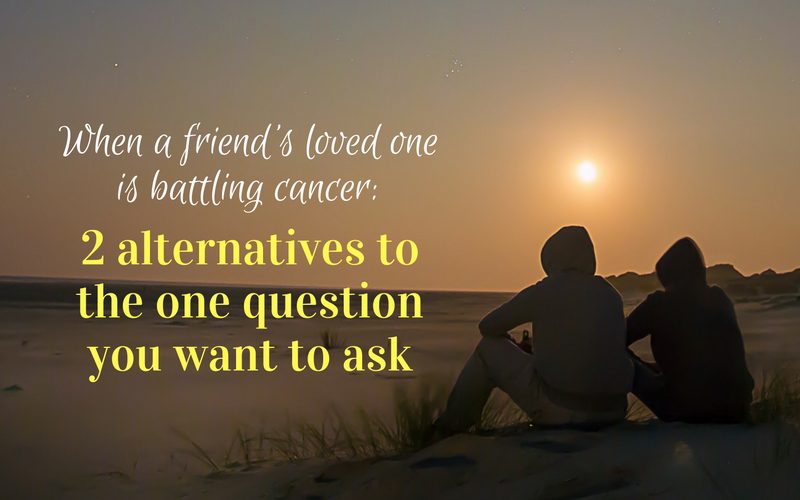It was the question I cherished and dreaded at the same time — the question I answered multiple times per week for three and a half years.
“How is your mom?”
Every time the words were spoken, I looked into the eyes of a concerned, loving, supportive face. Many of those faces had walked the same road I was walking. With every question, I felt less alone.
But at times, the question became more of a burden than a blessing.
A Hard Question to Answer
When a loved one is facing cancer (or any other ongoing health crisis), during the grueling weeks of treatment not much changes from week to week. Only a few times during Mom’s battle was there a major new development. Most of the time my answers to the question had to do with how she was handling the latest chemo treatment or that she was moved onto an experimental drug. And then there were the times where the true answer to the question involved side effects that I hesitated to share.
As Mom’s health began to decline, the question became harder to answer. The truth was, Mom was getting weaker. Until we called in hospice, we didn’t really have a reason for her decline, and answering the question took more of an emotional turn. Instead of dealing with the basics of her disease and treatment, we were dealing with the unknowns of “is this it?” Many times I searched for words because I had no idea how to answer the question.
What did I Expect?
I wrestled with the conflicting emotions of longing for someone to come up to me, hug me, and ask about my mom while simultaneously hoping no one would notice me so I could avoid answering “the question.”
At the height of my dissonance, I would ask myself, what did I want from my loved ones, my friends, and my church family? What did I expect?
It was a hard question to answer, but I determined to find out. I knew I wasn’t the only one who grappled with these emotions. When my father-in-law fought cancer, my mother-in-law dealt with similar emotions and took to blogging to update friends and family, curtailing the well-meaning questions that can become a heavy weight to bear.

Two Alternatives to “the Question”
In observing the interactions that brought me encouragement (compared to the ones that drained me), I found the two responses to be the best:
The No-Questions Support
I can think of three wonderful women from church who would make a point to come and simply hug me. The look in their eyes said it all. They loved me. They supported me. They prayed for me and my mom. Occasionally, they said quietly, “I’m praying for you.” They didn’t need details of my mom’s condition. They knew if there was anything new to report, I would have shared it either on the church’s prayer chain or on Facebook.
Sometimes I would also get an email, text, or Facebook message simply saying, “I’ve been thinking about you and want you to know I’m praying for you and your mom.” That was it. No questions, simply love and support. Sometimes I would reply with a quick update depending on the situation, but many times I didn’t feel the need to answer a question. I knew I could call on them but I didn’t feel the pressure to respond.
The Statement Question
The one drawback of a large support system is not remembering who you updated with what new information. So when someone asked, “How is your mom?” I wouldn’t know what information to share, and I couldn’t remember what I had told that particular person the last time she asked. I either accidentally left out details I assumed I had already told her or I gave her all the same details I gave her last time — without knowing.
When you multiply this interaction by the several times the question occurs in a week, it becomes draining. I found that one simple statement could reduce most of this strain:
“The last time we talked, your mom was going through this…” Then they would share the details of what they had heard last. Bingo. Depending on Mom’s current state, I could either say that everything was still the same (eliminating unnecessary purging of information already shared) or I could give new details.
An added benefit of this statement is knowing the person is paying attention and listening to the smallest of details. That is loving and takes a little extra effort that doesn’t go unnoticed.
Understanding that someone in a prolonged health struggle doesn’t always have “new” updates from week to week, the statement question relieves the unnecessary burden of rehashing the same information week after week.
Love and Support
We want to support those in crises or health struggles. We don’t always know what to say or do. And we don’t want to add to the barrage of questions but we don’t want to ignore their situation either. If in doubt, my advice is to always err on the side of asking, not ignoring. But in both of these responses above — the No-Questions Support and the Statement Question — the person feels loved and supported and at the same time not burdened with that support. And isn’t that the goal?
What about you? Have you experienced these emotions when going through or caring for someone going through a crisis? Or have you been the one wanting to lend support but haven’t known how to come alongside someone in their struggle?


Your post reminds me of the way I felt when my brother, Mom, and Dad were each in hospice. To avoid the “how is s/he” questions and the burden of rehashing details, my sister and I changed the outgoing message on the answering machine almost every day. People could call for updates and leave their own well wishes, prayers, and offers of help. It saved our sanity! (This was back before Facebook or the wonderful websites like CaringBridge and meal delivery websites.)
Thanks for your post. I passed it along to a friend who is working on a project to help cancer patients.
Glad I found you through Party on the Porch!
Thanks, Elizabeth! That was a great idea especially in days before social media. Thanks for stopping by!
As I read this, I thought of one question that might also be appropriate: “How can I pray about or for? Thank you for sharing your very personal journey and loss. Love you.
Yes, that’s a great question.